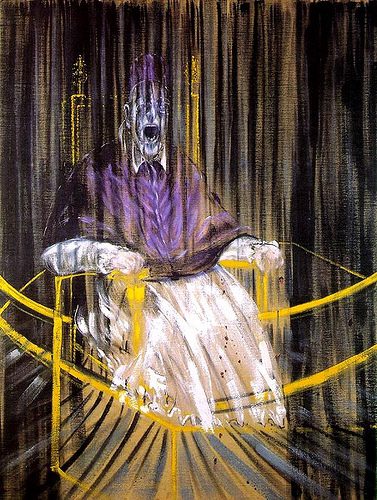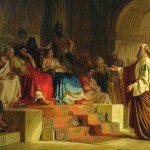
Study after Velazquez’s Portrait of Pope Innocent X (1953), by Francis Bacon (1909-1992) [Flickr / CC BY 2.0 license]
***
Dustin Buck Lattimore is a fair-minded, articulate, inquiring Protestant, who has been commenting a lot lately on my Facebook page. He asked me some questions about this topic. His words will be in blue.
***
I have a question about this idea, that there are doctrines that “not even the pope can change”. You’ve explained before how not every word the pope says is infallible, and that sinful popes don’t discredit papal infallibility because only certain statements (ex cathedra) are in the infallible category.
My question is this: when/how does the pope make ex cathedra statements? Is it retroactively applied to papal statements that jive with the existing doctrine or have been generally accepted as doctrine? Or does the pope, in that moment, announce “This is an ex cathedra statement”?
He does when he deems that the time has come — after so much development –: based on feedback from bishops and the laypeople en masse. When it happens, the language is very strong, definite, and clear.
If we take the Assumption of Mary as an example (1950), we can look back and see that prior statements were consistent with an understanding that this is true dogma, though before 1950 Catholics weren’t absolutely bound to it.
There are clearly a host of things that the pope can’t change. He can’t say Jesus isn’t God, or that the Bible isn’t inspired, or that Mary wasn’t a perpetual virgin. He is as bound to the Bible and received orthodox tradition as anyone else.
So if a pope did get up and attempt to say, ex cathedra, something that contradicted previous ex cathedra or council statements of doctrine, what would happen? Maybe not something so extreme as denying Nicene doctrines, but perhaps concerning something very serious, like the morality of abortion or homosexuality. I know this hypothetical may seem like a Protestant “gotcha” question, but it isn’t. I’m sincerely asking.
Then the Church-at-Large would rebel and refuse to accept it. This almost happened with Pope John XXII in the 14th century, with regard to the Beatific Vision. He hadn’t made an ex cathedra proclamation, but was teaching some falsehood. Here is an account from The Catholic Encyclopedia:
In the last years of John’s pontificate there arose a dogmatic conflict about the Beatific Vision, which was brought on by himself, and which his enemies made use of to discredit him. Before his elevation to the Holy See, he had written a work on this question, in which he stated that the souls of the blessed departed do not see God until after the Last Judgment. After becoming pope, he advanced the same teaching in his sermons. In this he met with strong opposition, many theologians, who adhered to the usual opinion that the blessed departed did see God before the Resurrection of the Body and the Last Judgment, even calling his view heretical. A great commotion was aroused in the University of Paris when the General of the Minorites and a Dominican tried to disseminate there the pope’s view. Pope John wrote to King Philip IV on the matter (November, 1333), and emphasized the fact that, as long as the Holy See had not given a decision, the theologians enjoyed perfect freedom in this matter. In December, 1333, the theologians at Paris, after a consultation on the question, decided in favour of the doctrine that the souls of the blessed departed saw God immediately after death or after their complete purification; at the same time they pointed out that the pope had given no decision on this question but only advanced his personal opinion, and now petitioned the pope to confirm their decision. John appointed a commission at Avignon to study the writings of the Fathers, and to discuss further the disputed question. In a consistory held on 3 January, 1334, the pope explicitly declared that he had never meant to teach aught contrary to Holy Scripture or the rule of faith and in fact had not intended to give any decision whatever. Before his death he withdrew his former opinion, and declared his belief that souls separated from their bodies enjoyed in heaven the Beatific Vision.
There was also the case of Honorius.
So neither of these guys actually tried to teach heresy in an ex cathedra statement. My question is, what would happen if a pope did? Would tradition and Scripture trump him, or would his words be the new doctrine? Or is this whole line of questioning considered an impossible counterfactual, like God sinning or doing the logically impossible?
Some think it is impossible. I think it is a possibility that a pope could be a heretic, but exceedingly unlikely, and a thing that never has happened in 2000 years. I don’t believe (in faith) that the pope could or would ever teach heresy ex cathedra and bind the Church to it (see, “On Heretical Popes,” by James V. Schall, S. J.):
Bellarmine and Suarez considered a de facto possibility of an heretical pope. They granted that the Church would have to depose him if he did not self-declare his heresy. They differed on the exact procedure that would be required. . . . Bellarmine and Suarez thought the Church, in the persons of a General Council or the assembled Cardinals would have to declare the pope a heretic and depose him.
What would it mean for your faith if it did happen? (again, not trying to score points for Protestantism, really asking).
Nothing. I already think it’s possible that a pope could personally be a heretic (though not declare the heresy ex cathedra), and the Church has thought about steps to take if it did happen. If something like this were to happen in fact, it likely already would have happened. The fact that it didn’t is a great argument for the Catholic system.
***
Dustin was discussing (in a perfectly acceptable way for a Protestant to inquire) all these hypotheticals: “what if this or that happened, what would the Church do / what would you think?” etc.
One can discuss a hypothetical without necessarily believing that it would ever happen. Even Paul did that in Scripture, “if Christ be not raised, we are of all men the most pitiable . . . ”
Dustin asked: “what would happen if a pope did [“teach heresy in an ex cathedra statement”]? . . . Or is this whole line of questioning considered an impossible counterfactual, like God sinning or doing the logically impossible?”
To get really philosophically heavy, at this point I would deny (in faith) that it could happen, but I don’t think it is an “impossible counterfactual” or “logically impossible” in all possible or conceivable worlds. It’s the difference between philosophy and faith. In faith, I don’t believe it ever would or could happen in fact.
But philosophy is a different epistemological system. There we can talk about sheer hypotheticals. And so I was partially doing that above, in saying that if it happened, the Church would form a council and kick out the heretic pope.













